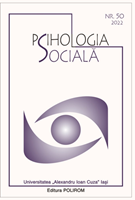Repere privind psihologia socială a culpabilizării şi reconcilierii intergrupuri
Highlights on the social psychology of culpability and intergroup reconciliation
Author(s): Natalia CojocaruSubject(s): Social psychology and group interaction, Social development, Social differentiation, Social Theory, Sociology of Politics
Published by: EDITURA POLIROM S.A.
Keywords: collective emotions; collective guilt; intergroup reconciliation;
Summary/Abstract: Based on the results of recent studies, in this article we will examine the implications of collective emotions against some negative events in the ingroup’s history amid intergroup reconciliation efforts. In order to review the existing literature on this subject, we intend to answer some questions: How are the collective negative emotions assumed and shared and what implications have on intergroup relations? How does a traumatic experience persist from the ingroup’s history for the next generations? What are the effects of social recognition on intergroup reconciliation? Various studies show that the postwar generations experience guilt more intensely than the generation directly involved in some historical events. Thus, the mere membership of a particular group determines emotional reactions to a conflictual event, even if consumed. On the other hand, when the ingroup’s victimization persists, the collective guilt to present illegalities of their own group can decrease. Ultimately, we find that intergroup reconciliation is the result of a process that should involve equally the both groups and require concessions on both sides .
Journal: Psihologia socială
- Issue Year: 2/2022
- Issue No: 50
- Page Range: 89-100
- Page Count: 12
- Language: Romanian
- Content File-PDF

